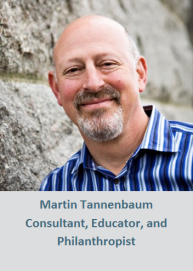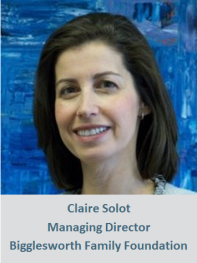Bringing greater fairness to the world takes a network. . .
the OneJustice network.
OneJustice supports a network of 100+ nonprofit legal organizations, law firms, law schools and businesses. Each year this network provides life-saving legal help to over 275,000 Californians facing legal barriers to basic life necessities and core civil rights. You – like everyone in our network – are an essential part of the solution to the fact that millions of our neighbors suffer needlessly from solvable legal problems.
In honor of the work that our network does, each month we’ll feature an interview with a different participant in the network.
This month we interviewed Martin Tannenbaum, Program Director and Faculty of our Executive Fellows program and a generous investor in OneJustice’s work.
Martin, you’ve had a long history in the private sector. How does that experience impact your work with OneJustice?

Martin Tannenbaum, Executive Fellows Program Director, is a proud member of the OneJustice network.
For many years, I earned a living developing new businesses and services in healthcare and financial services. I built a reputation as the person who could innovate and create change in some of the largest corporations in the U.S. But it’s one thing to create change when you have the resources of a Merrill Lynch, quite another when you’re operating in the social services sector. The opportunity seemed too great to resist for someone committed to change and innovation.
About 12 years ago, I was drafted by the Entrepreneurship and Strategy Department at Boston University’s School of Management to teach innovation and corporate entrepreneurship. One of my colleagues, Andrew Wolk, a social entrepreneur, introduced me to the idea of cross-fertilizing the best of business theory and practice with the passion of the social services sector. I helped him create curriculum for the Inner City Entrepreneur program – which introduced cutting edge business research and case studies to mostly minority business owners within Boston neighborhoods. We engaged a wide range of faculty, developed peer-support networks and recruited mentors to assist these entrepreneurs in making critical changes in their business models and operations – and building their commitment to give back to their communities. It worked to transform their businesses; a more refined model worked for middle managers at Jewish Family and Children’s Services; and now with the OneJustice Executive Fellowship Program, it has begun to change the approach and success of leaders within the legal services sector.
What gets you excited about working with OneJustice?
OneJustice is committed to changing the sector – which means operating more effectively in order to serve increasing numbers of clients in a less certain revenue environment. By providing a range of training and support to legal services organizations, OneJustice is uniquely positioned to increase the effectiveness and reach of the many worthy and under-resourced organizations across the state of California. Also, by advocating in Washington, OneJustice is a clear voice for the needs of the underserved.
You’ve worked in lot of industries and sectors. What do you think sets the legal services sector apart from other industries?
The force of law has the ability to change people’s lives in fundamental ways. At its best, our courts can and should affirm the dignity and importance of each person in our society – and each person’s right to live fully and equally. And a win for one person, can be leveraged to enhance the position of many. I have seen the courts change the face of what it means to be female, African American, GLBT, and differently-abled. The legal services sector drives this important work.

Executives of nonprofit legal organizations are to for-profit executives as Ginger Rogers was to Fred Astaire. They do all the same work – but backwards….and in heels!
How would you compare and contrast the challenges for legal services leaders versus business leaders?
I’ve said this many times, and I’m not sure who deserves the attribution, but I think leading in this sector is a lot like being Ginger Rogers – you have to do everything that Fred Astaire does – but backwards and in heels. And then Fred gets most of the accolades. I greatly admire our legal services leaders.
What makes OneJustice’s Executive Fellowship different from other executive programs?
There are a number of key differences. While the Fellowship is focused on the legal services sector – cases and discussions are about real challenges and solutions within legal services organizations – the faculty are from outside the sector. We need fresh ideas and the ability to borrow from private and social sector organizations that are thinking differently to meet growing needs. Our faculty has extensive experience with both for-profit and non-profit organizations. The program also challenges participants to make explicit links between what they learn and do. Too much adult learning is about stimulating people for a day or two and then they go back to work and lack the know how or time to apply what they learned. We make it clear that it’s not about piling on new ideas – but taking things off their plate to make room for real change. Finally, the cost is a real differentiator. Because our program is generously underwritten by the Marcled Foundation and people who believe in the need for change in our sector, participants pay less than 20% of what a program of this caliber costs elsewhere.
In addition to being a lead faculty for the Executive Fellowship program, you also personally support OneJustice. Why do you make your own personal investment in OneJustice’s work?
I give where my support can have the greatest impact. I know that because OneJustice creates stronger legal services organizations, each dollar I give can affect many more clients; can improve the effectiveness and efficiency of many organizations; can help speak with a strong voice to legislators and others who control the purse strings. I am also impressed with the way OneJustice “does business” – they have honed their revenue model, built a strong management team, and of course, I have the utmost respect for Julia Wilson, the Executive Director. She brings unique vision and energy not just to OneJustice, but to the entire sector.
What’s your vision for the future of legal services?
The future of legal services is being written today. Leaders are creating sustainable business models, rethinking delivery, meeting unmet needs, communicating effectively with those than can and should underwrite their important work. And I want to continue to be a part of this future.
Why OneJustice?
OneJustice does just what its name says – it seeks to create justice for everyone. I was taught that restoring a shattered world (“tikkun olam”) should be my main occupation. I feel extremely lucky that I’ve found an organization that shares my vision.
avan117
californiahearings
cmcconkeyonejustice
jennafinkle
Julia R Wilson
Kelsey Williams
kimirishonejustice
Lauren Roberts
Michael Winn
miguelcas3
OneJustice Team
probonotraining
Renée Schomp
stephaniemhernandez
![[Photo: Toby Rothschild, Of Counsel to OneJustice.]](https://onejusticeblog.files.wordpress.com/2015/09/high-res_toby-rothschild.jpg?w=283&h=283)
![[PHOTO: Elizabeth Schaffer, CFO at the Global Fund for Women and Executive Fellowship faculty.]](https://onejusticeblog.files.wordpress.com/2015/08/20110720elizabethschaffer_2.jpg?w=225&h=319)
![[Photo: 2014-15 Cohort during one of their many Executive Fellowship classes, which include becoming a great communicator, human resources, financial context and ratios, and budgeting and change management.]](https://onejusticeblog.files.wordpress.com/2015/08/1466183_814970291893774_4856900012674937154_n.jpg?w=357&h=357)


 Every year, the OneJustice network gathers at our
Every year, the OneJustice network gathers at our 

